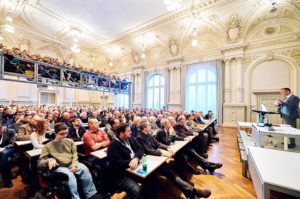Originally Published: February 4, 2017
Last week, I did my first trip abroad as Associate Administrator of Science at NASA, visiting both Switzerland and France.
My first talk was to an audience of about 600+ at the University of Bern, my alma mater. I started my presentation by announcing that we were making history today since I was the first NASA Associate Administrator to give a science talk in German (pic below from U Bern). I had prepared for over four hours to ensure that i knew all the words. During this chat, I discussed the impact that science has in the world. From benefiting humanity on Earth, to the importance of fundamental research, the science that NASA does on a daily basis is critical.
I also gave a lunch talk in Swiss German three days later where I focused on the power of innovation and leadership in organizations. The next day, I finally gave a talk to a French audience. Even though I took some questions in French, I did not dare give my talk in French just having arrived in Paris the day before.
I studied French for 10 years. French is the only subject area in my entire education I did not pass. The only comfort for me as a teenager: Einstein also failed French. In fact, French was my first true foreign language and I despised learning it, not realizing how powerful languages would become in my life. Only a few years later, I lived in a French speaking town and later I shared an apartment with a friend who spoke French.
For many scientists, foreign languages are much more difficult to learn than math or science. But, I have become a strong proponent and actively encourage students to do so. When learning a foreign language two things happen. First, one learns to communicate to more and different people on this Earth. Second, and equally important, learning a new language makes one think of one’s own language. We learn about its origins, its defining characteristics, and also about culture in new and different ways as language and culture are deeply interrelated.
Why is this important? From decades of observations and experiences, I am convinced that the ability to communicate fluently across cultural boundaries is directly linked to the richness of ones personal experiences and also to career success. If we only talk to people who think and talk like us, even when speaking in our native language, we never fully realize the power of what we do to truly make the world better.

